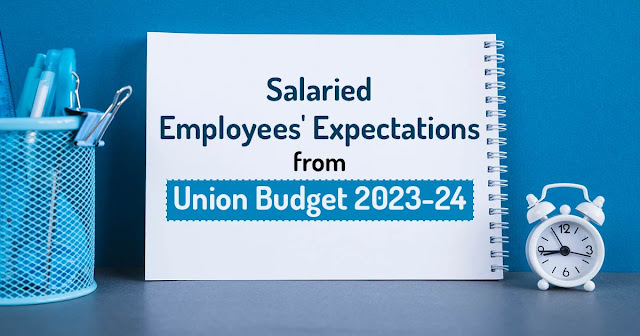There is a huge gap between the amount of tax paid by salaried employees and the number of tax exemptions they receive in India. On February 1, 2022, the Government will present the Budget 2023, which has big expectations. The budget may not be a populist one, according to some experts.
Salary employees can expect rationalisation of income tax slab rates, both when it comes to limitations and rates, according to a tax expert. In addition to an increase in the standard deduction, which could be a fixed increase or a progressive deduction based on total income, he predicted an increase in the standard deduction from Budget 2023.
We can salary individuals expect Budget 2023-24 to be a taxpayer-friendly budget, focusing on benefits that taxpayers may be able to enjoy before election day in 2024. It is, however, important for the government to keep in mind that the Indian economy is already recovering financially from the impact of the Covid-19 pandemic. According to a tax expert, the government will ensure that its goal of preparing a budget boosts economic growth as well as meets taxpayer expectations.
Budget 2023 is expected to bring the following benefits to salaried employees, according to tax experts:
House Rent Allowance (HRA)
The Housing Rent Allowance has been increased to accommodate the increased rental rates following COVID, as well as the work-from-home culture.
New Income Tax Regime
The new income tax regime should be made more attractive to salaried taxpayers since it is currently not being taken up by that many.
Read also: How to Claim HRA While Filing Your Income Tax Return (ITR)?
Income Tax Section 80C
In view of high inflation and to encourage personal savings and investments, Mangal said he expects the limit for section 80C deductions (currently capped at Rs. 150,000) to be increased. There have been no increases in this limit for about a decade.
The amount deducted for tax saving investments under Section 80C of the Income Tax Act, 1961 has not increased since Financial Year 2014-15 when Rs.1,50,000 was deducted. In a similar manner, Rs.2,50,000 is predicted to be established respectively. In addition to reducing tax liability, it also allows the salaried class to prosper and enjoy the lowest tax rate, Singh explained.
Income Tax Incentives for Salaried Individuals
Employees who earn salaries can expect to be incentivized by budget 2023 since no significant benefits were provided in budget 2022. In order to reduce their tax liabilities, middle-class employees should have a standard deduction of Rs 80,000 instead of Rs 50,000, according to experts.
Allowance for Working From Home
Many companies implemented Work From Home structures after the Covid-19 pandemic. The purpose of this approach differs from the traditional work pattern and has been detrimental to employees in many ways.
Several expenses that were earlier borne by employers are now the employee's responsibility, including electricity and internet charges. Considering this, even if the employer provides the employee with an allowance in this regard, the same is taxable under the heading Salaries in the employee's hands. Work from Home allowances will be introduced in this budget to rationalize and tax benefits for salaried workers, a tax professional said.
Basic Income Tax Exemption Limit
It is expected that the basic exemption limit of Rs 2,50,000 should be increased for those with a lifespan of fewer than 60 years, giving relief to the salaried class in lower pay scales and reducing tax burdens.


Comments
Post a Comment